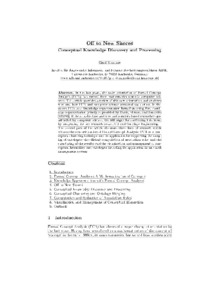Off to new shores
| dc.date.accessioned | 2009-03-09T13:54:51Z | |
| dc.date.available | 2009-03-09T13:54:51Z | |
| dc.date.issued | 2003 | |
| dc.identifier.uri | urn:nbn:de:hebis:34-2009030926583 | |
| dc.identifier.uri | http://hdl.handle.net/123456789/2009030926583 | |
| dc.format.extent | 10151045 bytes | |
| dc.format.mimetype | application/pdf | |
| dc.language.iso | eng | |
| dc.rights | Urheberrechtlich geschützt | |
| dc.rights.uri | https://rightsstatements.org/page/InC/1.0/ | |
| dc.subject | Wissenserwerb | ger |
| dc.subject.ddc | 004 | |
| dc.title | Off to new shores | eng |
| dc.type | Preprint | |
| dcterms.abstract | In the last years, the main orientation of Formal Concept Analysis (FCA) has turned from mathematics towards computer science. This article provides a review of this new orientation and analyzes why and how FCA and computer science attracted each other. It discusses FCA as a knowledge representation formalism using five knowledge representation principles provided by Davis, Shrobe, and Szolovits [DSS93]. It then studies how and why mathematics-based researchers got attracted by computer science. We will argue for continuing this trend by integrating the two research areas FCA and Ontology Engineering. The second part of the article discusses three lines of research which witness the new orientation of Formal Concept Analysis: FCA as a conceptual clustering technique and its application for supporting the merging of ontologies; the efficient computation of association rules and the structuring of the results; and the visualization and management of conceptual hierarchies and ontologies including its application in an email management system. | eng |
| dcterms.accessRights | open access | |
| dcterms.alternative | Conceptual knowledge discovery and processing | eng |
| dcterms.creator | Stumme, Gerd | |
| dc.description.et | Extern | ger |
| dc.description.everything | Auch erschienen in: International journal of human - computer studies. Amsterdam : Elsevier, Vol. 59 (2003), No. 3, S. 287-325 | ger |
| dc.subject.swd | Formale Begriffsanalyse | ger |
Dateien zu dieser Ressource
Das Dokument erscheint in:
-
Publikationen [55]

